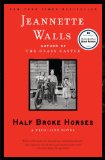Summary | Excerpt | Reading Guide | Reviews | Beyond the Book | Readalikes | Genres & Themes | Author Bio

A True-Life Novel
by Jeannette Walls
Also, whenever it rained, the ceilings and walls in the dugout turned to mud. Sometimes clumps of that mud dropped from the ceiling and you had to pat it back in place. And every now and then, the goats grazing on the roof would stick a hoof clear through and we'd have to pull them out.
Another problem with living in the dugout was the mosquitoes. They were so thick that sometimes you felt like you were swimming through them. Mom was particularly susceptible to them -- her bite marks sometimes stayed swollen for days -- but I was the one who came down with yellow jack fever.
I was seven at the time, and after the first day, I was writhing on the bed, shivering and vomiting. Mom was afraid that everyone else might catch the disease, so even though Dad insisted that you got it from mosquitoes, he rigged up a quilt to quarantine me off. Dad was the only one who was allowed behind it, and he sat with me for days, splashing me with spirit lotions, trying to bring the fever down. While I was delirious, I visited bright white places in another world and saw green and purple beasts that grew and shrank with every beat of my heart.
When the fever finally broke, I weighed some ten pounds less than I had before, and my skin was all yellow. Dad joked that my forehead had been so hot he almost burned his hand when he touched it. Mom poked her head behind the quilt to see me. "A fever that high can boil your brain and cause permanent damage," Mom said. "So don't ever tell anyone you had it. You do, you might have trouble catching a husband."
Mom worried about things like her daughters catching the right husband. She was concerned with what she called "proprieties." Mom had furnished our dugout with some real finery, including an Oriental rug, a chaise longue with a lace doily, velvet curtains that we hung on the walls to make it look like we had more windows, a silver serving set, and a carved walnut headboard that her parents had brought with them from back east when they moved to California. Mom treasured that headboard and said it was the only thing that allowed her to sleep at night because it reminded her of the civilized world.
Mom's father was a miner who had struck gold north of San Francisco and became fairly prosperous. Although her family lived in mining boom towns, Mom -- whose maiden name was Daisy Mae Peacock -- was raised in an atmosphere of gentility. She had soft white skin that was easily sunburned and bruised. When she was a child, her mother made her wear a linen mask if she had to spend any time in the sun, tying it to the yellow curls on the side of her face. In west Texas, Mom always wore a hat and gloves and a veil over her face when she went outdoors, which she did as seldom as possible.
Mom kept up the dugout, but she refused to do chores like toting water or carrying firewood. "Your mother's a lady," Dad would say by way of explaining her disdain for manual labor. Dad did most of the outdoor work with the help of our hand, Apache. Apache wasn't really an Indian, but he'd been captured by the Apaches when he was six, and they kept him until he was a young man, when the U.S. Cavalry -- with Dad's pa serving as a scout -- raided the camp and Apache ran out yelling, "Soy blanco! Soy blanco!"
Apache had gone home with Dad's pa and lived with the family ever since. By now Apache was an old man, with a white beard so long that he tucked it in his pants. Apache was a loner and sometimes spent hours staring at the horizon or the barn wall, and he'd also disappear into the range now and then for days at a time, but he always came back. Folks considered Apache a little peculiar, but that's what they also thought of Dad, and the two of them got along just fine.
To cook and wash, Mom had the help of our servant girl, Lupe, who had gotten pregnant and was forced to leave her village outside Juárez after the baby was born because she had brought shame on the family and no one would marry her. She was small and a little barrel-shaped and even more devoutly Catholic than Mom. Buster called her "Loopy," but I liked Lupe. Although her parents had taken her baby from her and she slept on a Navajo blanket on the dugout floor, Lupe never felt sorry for herself, and that was something I decided I admired most in people.
Excerpted from Half Broke Horses by Jeannette Walls. Copyright © 2009 by Jeannette Walls. Excerpted by permission of Simon & Schuster. All rights reserved. No part of this excerpt may be reproduced or reprinted without permission in writing from the publisher.
Your guide toexceptional books
BookBrowse seeks out and recommends the best in contemporary fiction and nonfiction—books that not only engage and entertain but also deepen our understanding of ourselves and the world around us.